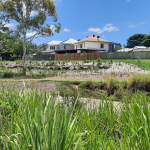2015 Stormwater Quality Offsets Forum
26th November 2015
- Dr Andrew O’Neill, Healthy Waterways
- Elissa McConaghy, Moreton Bay Regional Council
- Josie Raftery, Toowoomba Regional Council
- Kym Whiteoack, RMCG
- Tony Costantini, Planfuture (representing Port of Brisbane)
Video 1: Activity
Video 2: Discussion
Video 3: Presentations
The Death of the Backyard - An Issue for Stormwater
26th February 2015
“The Death of the Backyard – An Issue for Stormwater” by Professor Tony Hall.
A substantial backyard has long been considered an iconic feature of Australian suburbs. From the air, they appear dominated by tree cover. Nevertheless, since the late 1990s, almost all new houses throughout the country have had minimal planted space around them. From above, they seem to be almost roof-to-roof. Taken together with the adjacent wide roads and concrete driveways, this clearly has severe adverse implications for stormwater run-off.
The issue is larger houses rather than higher densities. It appears driven by the trend towards greater debt, longer working hours and an indoor, air-conditioned, car-based lifestyle. Planning codes, while not actually encouraging the trend, do nothing to prevent it. It has serious ecological implications for the community as a whole, including a significant reduction not only in sustainable drainage but also in biodiversity and a beneficent microclimate.
The Queensland Floods Inquiry – Lessons Learnt and New Requirements
26th June 2014
This Presentation provided a review of the 2010/2011 Queensland floods and the effects they had on Queensland Communities. Presented by Neil Collins, BMT WBM, it reviewed key outcomes of the Queensland Floods Commission of Inquiry.
The Performance of Proprietary SQIDs – The Facts, The Fiction and The Future Testing Protocol
10th April 2014
In 2010 Stormwater Australia embarked on an ambitious leadership project to develop a process to allow the assessment of the performance of stormwater quality improvement devices (SQIDs) and to develop an Australian protocol for the testing of SQIDs.
Stormwater Quality Improvement Devices (SQIDs) have been installed at thousands of locations across Queensland, with the objective to protect our waterways from stormwater pollution. There is, however, varying opinions on aspects relating to SQIDs – including how effective these devices are at removing pollutants and whether differing testing procedures (used to demonstrate their performance) are appropriate to ‘real-world’ conditions in Queensland.
Stormwater Queensland hosted a forum on this topic where a range of issues were discussed including:
- The appropriateness of existing testing procedures applied to assess the performance of SQIDs.
- The accuracy of the reported treatment performances of SQIDs and their applicability to Queensland conditions.
- The suitability of advice within industry-accredited guidelines in relation to SQIDs.
- The development of an Australian Protocol for the assessment of SQIDs (currently being undertaken by Stormwater Australia).
- The implications that this protocol may have on stakeholders within the industry.
- Perspectives from consultants, asset managers and SQID proprietors.
The Performance of Proprietary SQIDs – Panel Discussions
10th April 2014
Panel Members included:
- Andrew Allan, Stormwater Australia
- Stephen D Baker, Rocla
- Andy Hornbuckle, SPEL Environmental
- Dr Charles Kelly, Humes
- Andrew Macklin, Ecosol
- Stephen Turfrey, Redland City Council
- Tony Weber, BMT WBM
- Michael Wicks, Stormwater 360
Urban Water Research Outcomes for Stormwater and Rainwater Management in South East Queensland (SEQ)
21st March 2013
Don Begbie, CSIRO Land and Water
Well Designed Bioretention and Bioretention-free Design: An Introduction to the New Bioretention Technical Design Guidelines and Case Study Showing One Way of Avoiding Bioretention Altogether
31st January 2013
Jack Mullaly, Healthy Waterways and Alan Hoban, Bligh Tanner Consulting Engineers
Revised Intensity-Frequency-Duration (IFD) Design Rainfalls for Queensland
30th August 2012
Janice Green, Bureau of Meteorology, Climate & Water Division




